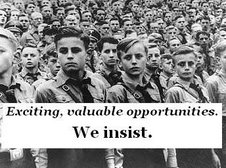Burning Our Money has a very good post on life in Dewsbury Moorside and specifically the road where Shannon Matthew's family live. I don't intend to copy the post here or make many references because I want to talk about how we go here. But to give you an insight:But round our way, that isn't what people are talking about. Round our way, everyone's clucking about her family circumstances, five siblings by different fathers and all. And those neighbours we met at the street celebrations afterwards [go and see the picture, but not while you are eating]
...
According to the local paper this is "one of most deprived areas in the country". That conclusion is based on a giant number crunching exercise carried out by the Department for Communities and Local Government and known as the Index of Deprivation 2007.
...
Another big difference is in working for a living. Unemployment and "incapacity" together account for around 13% of the adult population not working, compared to 8% nationally. Add in another 4% for lone parents (see below) not working, and we've got around 17% of the working age population being supported by the state rather than earning their own way. That's about 70% higher than the national average.
Against that background it's not surprising that welfare payments make up a good proportion of the community's income. 23% of the working age population claim a "key benefit" (cf 14% nationally), including 4% on Jobseekers Allowance, and 10% on Incapacity Benefit. Income support claimants, at 10% of the population, are three times the national average, and Housing and Council Tax Benefit claimants (14%) are more than 50% above average.
So how have we got to this point? At one time people would have been ashamed to have children out of wedlock, but even when they did parents tended to stick together. teenage pregnancy was a great source of social stigma, which gave girls the incentive to keep their legs closed until they had at least a promise of marriage. Nobody would accept unemployment as a way of life, as well as living in poverty it was part of a man's duty to provide and if you didn't you were looked down on.
I think iit is a good thing that we no longer have these social stigmas; what people do with their life is their business within reason, but we seem to have gone from accepting these lifestyles to positively rewarding them. Which means that humans beings, being fairly rational, will see them as a career choice.
So what can be done? I don't want to see a return to stigmatising people for their lifestyle choices, that path leads to honour killings, back street abortions and suicides. BOM is partly right:
So here are some suggestions:
Freeze welfare benefits, especially the reward for having children: welfare should not be an attractive career choice
Freeze the minimum wage: Brown likes to brag how the minimum wage has not destroyed jobs, but in areas like the poor end of Dewsbury a national minimum wage almost certainly means unskilled low-end labour cannot find work
But these are symptoms. We need to get the apologists for these people, the Polly Toynbee's of this world, to stop excusing people. We have to get our politicians to stop their race to the bottom, seeing who can give away most of our money, and get them to start preaching personal responsibility.
I hate saying this because we push too much on to schools but they are the ones who have to inculcate personal responsibility in to our children. Nobody should be leaving school without a clear understanding that they, and they alone, are responsible for their own lives. Yes there will be a minimum standard of life for the unfortunate, but not the reckless and feckless. A CBI payment is probably worth a try.











1 comment:
"A CBI payment is probably worth a try".
Totally agreed. Achieving full employment is easy, actually:
1. Replace welfare with CBI, or at least reduce total withdrawal rates to the basic rate of tax + NI.
2. Scrap NMW.
3. Scrap Employer's NIC.
Post a Comment